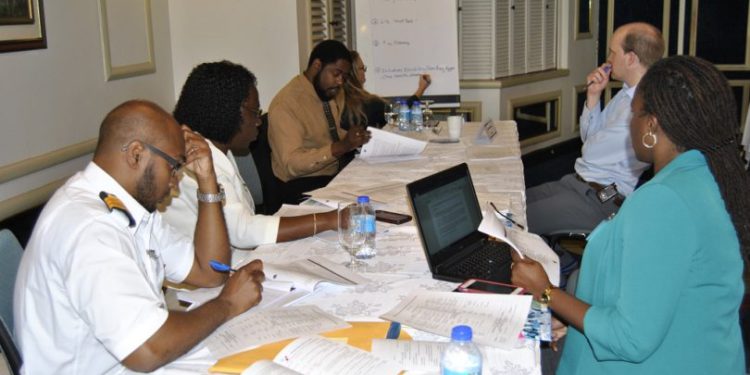Port of Spain, Trinidad and Tobago. May 25, 2017. “We live in a global village where situations related to health security impact us and we in turn can have an impact on the world. Therefore, we see keeping residents and visitors in the Caribbean region safe by controlling the spread of infectious diseases as key to regional health security.” These were the words of Dr C James Hospedales, Executive Director of the Caribbean Public Health Agency (CARPHA), as he spoke at the Opening Ceremony of the Regional Coordinating Mechanism on Health Security (RCMHS) meeting coordinated by the Agency.
The two-day meeting held from 9-10 May 2017, at the Trinidad Hilton and Conference Centre, brought together participants from CARPHA Member States, regional and international organisations to discuss the implementation of a Regional roadmap for health security. The Draft Caribbean Region Global Health Security Agenda Five-Year Roadmap (2017-2021), was developed at the Global Health Security Agenda Caribbean Roadmap Workshop which was held in Miami, Florida, in November 2016.
In 2014, CARICOM Heads of Government at their Seventeenth Special Meeting in Port of Spain, Trinidad and Tobago, called for the establishment of a Regional Coordination Mechanism on Ebola (RCME) with a ten-point plan of action. Realising that beyond Ebola the threat to health security is still very real, the RCME morphed into the RCMHS to help counter any threat to regional health security. As a region of very small, highly vulnerable and inter connected countries and territories where there is a political economic integration movement, a regional approach to health security is necessary to realise any success.
Speaking to the issue, Dr Bernadette Theodore-Gandi, the Pan American Health Organization/World Health Organization Representative for Trinidad and Tobago stated, “In order to prevent another devastating event like the Ebola outbreak in West Africa, countries need resilient and inclusive health systems, a sensitive early warning system coupled with rapid response capacity, and informed and engaged communities that trust the health services that the governments provide. Countries also need access to effective and affordable vaccines, diagnostics and treatments, good laboratory and logistics capacity, and safe and sufficient treatment facilities which are properly staffed and equipped.”
Health security, however, is not only associated with outbreaks of infectious diseases and bio-terrorism, but is threatened by non-communicable diseases which can negatively affect the workforce and increase the burden on economies and health systems.
Dr Rudolph Cummings, Programme Manager, CARICOM Secretariat, also spoke at the opening of the meeting. He highlighted the Secretariat’s role as that of a coordinating one, assisting countries in the pooling of resources to gain desired outcomes. He commended the networks formed and supported the multi-disciplinary approach adopted to addressing regional health security.
The meeting was funded by the Inter-American Development Bank and facilitated by Dr Rosmond Adams, Head, Health Information, Communicable Disease & Emergency Response (HCE). The RCMHS is expected to meet again in the second half of 2017, to advise on issues relating to implementation of the roadmap and sustainable financing.









